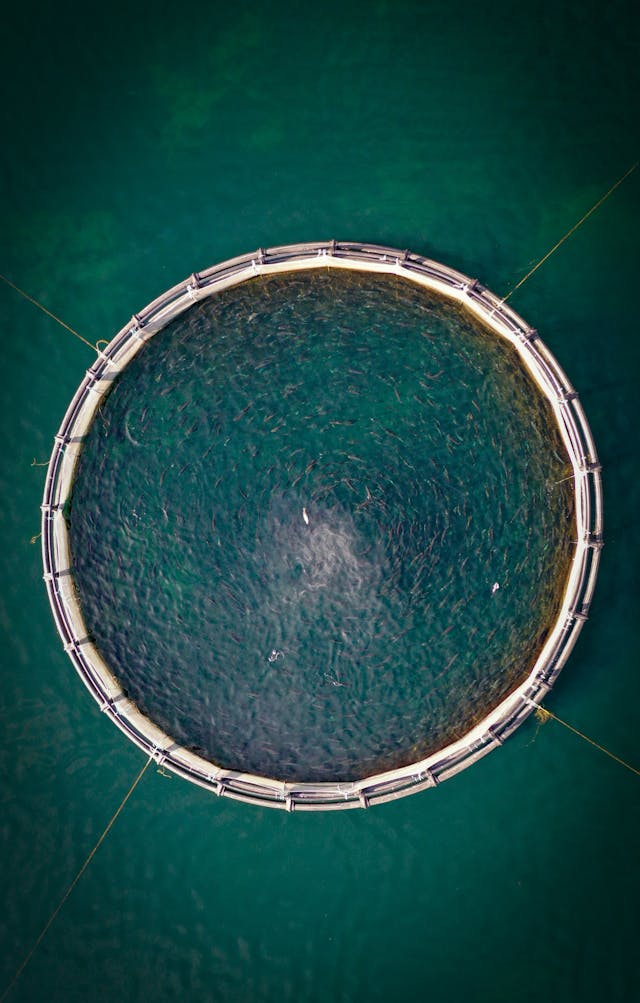main content The Hidden Costs of Aquaculture: How Fish Farming Is Decimating Wild Fish Stocks
Visiting Assistant Professor Hira Jaleel explains aquaculture’s adverse impacts on animal welfare, wild fish stocks and local communities, and highlights the need for legal reform.

Given the immense animal suffering and environmental damage associated with industrial animal agriculture, many are looking to seafood as a potential alternative to products derived from terrestrial animals. However, overfishing has already exerted tremendous pressure on wild fish stocks, leading to the collapse of fish populations around the world. Aquaculture, including finned fish farming, is often presented as a sustainable alternative to commercial fishing. Unfortunately, this image of sustainability quickly unravels upon closer inspection. While aquaculture now supplies more than half of the world’s seafood, its impact on animals and the environment is far from benign. In fact, many practices within the aquaculture industry are placing significant pressure on wild fish stocks and the environment, raising pressing questions about the true sustainability of this industry.
The Dependency on Wild Fish
One of the most significant problems with aquaculture is its dependency on wild-caught fish to feed farmed species. Aquatic animals like salmon, shrimp, and other high-demand species rely heavily on fishmeal and fish oil, which are derived from wild-caught fish such as anchovies and sardines. Approximately 20% of the global catch of wild fish goes toward making fishmeal, and much of it is directed to feed farmed aquatic animals. This demand has intensified over the years, creating a troubling feedback loop where the aquaculture industry depletes wild fish stocks to sustain itself. The depletion of smaller forage fish is particularly concerning, as these fish play an essential role in marine ecosystems, supporting larger species, including wild fish, marine mammals, and seabirds. This disruption cascades through the ecosystem, compromising biodiversity and destabilizing entire marine habitats.
The detrimental impact of aquaculture on wild fish stocks is underscored by a recent study published in Science Advances. The study highlights that global aquaculture’s dependence on wild fish for feed is significantly higher than previously estimated. Researchers found that the fish-in-fish-out (FIFO) ratio, a measure of the wild fish biomass needed for farmed fish production, is between 0.36 to 1.15. This means that wild fish inputs into aquaculture may range from 27% to 307% higher than earlier estimates. For certain species, like salmon and trout, the input ratio can exceed double the amount of fish produced. Including other factors like wild fish mortality and collateral capture mortality (“slippage”) pushes this ratio up even further.
The study raises serious concerns about aquaculture’s sustainability, as current practices put substantial pressure on marine ecosystems. While alternative feed sources, such as crop-based ingredients, are supplementing wild fish inputs, they are not fully replacing them. Additionally, shifting from marine to terrestrial feed inputs requires additional environmental trade-offs like increased land use. The findings suggest a need for improved transparency and reevaluation of sustainability policies related to aquaculture growth and feed practices.
Aquaculture’s increasing pressure on wild fish stocks is also a food justice issue. In 2022, a United Nations Food and Agriculture Organization report noted that the fish meal and fish oil industries were harming food security in West Africa. In countries such as Mauritania, Senegal, and The Gambia, small pelagic fish that are central to local diets and livelihoods are increasingly diverted to fish meal and fish oil production. This industry supplies aquaculture and livestock feed for overseas markets, primarily in Europe and Asia, rather than sustaining the dietary needs of West African communities. Consequently, local fish stocks, essential for food security, are being overexploited, intensifying food insecurity and undermining artisanal fisheries that provide both employment and a critical protein source for millions in the region.
Moreover, animal welfare in aquaculture is also a critical area of concern, as the industry continues to grow to meet global seafood demand. In intensive farming environments, fish and other aquatic animals often face overcrowded conditions, which can cause stress, disease, and physical injury due to limited space and interactions. Common aquaculture practices, such as the use of antibiotics and handling techniques, can lead to high mortality rates and impact animal health. Additionally, the law generally does not account for aquatic animal welfare during farming, transport or slaughter, leaving these animals particularly vulnerable to suffering.
In essence, portraying aquaculture as an environmentally friendly alternative to commercial fishing is misleading, given the sheer number of wild fish required to feed commonly farmed species like salmon and shrimp. Aquaculture raises critical concerns around food justice, animal welfare, and environmental protection that must be addressed through comprehensive legal and policy frameworks.
The Role of Law in Mitigating Aquaculture’s Harms
The environmental and ethical implications of aquaculture demand legal interventions. Countries worldwide are beginning to recognize the necessity of regulating and, in some cases, banning unsustainable fish farming practices. One promising approach is prohibiting the farming of carnivorous aquatic species, which pose the highest risks to wild fish stocks and marine ecosystems. For example, in the United States, states like Washington and California have banned octopus farming. Because they are carnivorous animals, farming octopuses would likely require large quantities of fish-based feed, which has the potential to place further strain on marine ecosystems by increasing demand for wild fish stocks. Banning octopus farming could address this problem, along with other associated concerns, such as welfare issues.
Additionally, other nations have already taken steps to curb the harms of aquaculture. In 2021, a provincial government in Argentina voted to ban intensive salmon farming in Argentinian waters. Earlier this year, the Canadian government announced a ban on open-net salmon farming in coastal waters from July 2029, as part of a commitment to “protecting wild salmon and promoting more sustainable aquaculture practices”. Phasing out harmful aquaculture practices could be promising for the recovery of overexploited wild fish stocks.
Learn More in the Aquatic Animal Law Course at CALS
For those interested in diving deeper into the complexities of aquaculture and its legal implications, the Center for Animal Law Studies offers an Aquatic Animal Law course. Available both in person and online, this course explores the ethical, environmental, and legal issues surrounding aquaculture and provides students with the tools to advocate for aquatic animal protection effectively.

Hira Jaleel is a Visiting Assistant Professor at the Center for Animal Law Studies (CALS). She served as Animal Law Teaching Fellow at CALS since August of 2022, as well as served as an Adjunct Professor at Lewis & Clark Law School, teaching Aquatic Animal Law and co-teaching Food Law with Professor Pamela Frasch. She is also an Animal Law LLM (’20, Pakistan) of Lewis & Clark Law School. Hira’s research and scholarship focus on international animal law, industrial animal agriculture law, food law, and aquatic animal law, with extensive publications on animal law developments in South Asia.
The Center for Animal Law Studies (CALS) was founded in 2008 with a mission to educate the next generation of animal law advocates and advance animal protection through the law. With vision and bold risk-taking, CALS has since developed into a world-renowned animal law epicenter. CALS’ Alumni-in-Action from 30 countries are making a difference for animals around the world. Animal law advanced degrees are offered in-person and online. CALS is a self-funded Center within the law school operating under the Lewis & Clark College 501(c)(3) tax-exempt status, and is able to provide these educational opportunities through donations and grants.
Center for Animal Law Studies is located in Wood Hall on the Law Campus.
MSC: 51
email cals@lclark.edu
voice 503-768-6960
Center for Animal Law Studies
Lewis & Clark Law School
10101 S. Terwilliger Boulevard MSC 51
Portland OR 97219
More Stories

Despite International Protections, Threats to Rays Persist
Exploitation has driven ray species to the brink; emerging action in international law suggests that stronger protections for rays may be necessary.

The Law & Ethics of Using Animals in Research and Testing
Learn about our Law & Ethics of Animal Testing course and scholarship opportunities for those passionate about advocating for animals used in research and testing.

Companion Animal Law Evolves to Protect People and Their Pets
Lewis & Clark sparks a national movement to protect both people and their pets by redefining the role of companion animals in the legal system.

Protecting Farmed Animals in Memory of Thomas Bloom Raskin
Megan Rosen, LLM Candidate, Named Inaugural Recipient of the Thomas Bloom Raskin Animal Protection Scholarship
